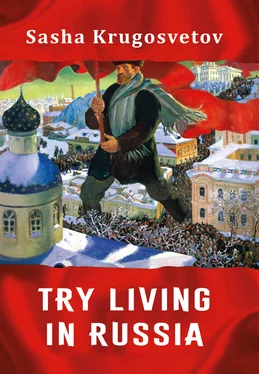Sasha Krugosvetov - Try living in Russia
Здесь есть возможность читать онлайн «Sasha Krugosvetov - Try living in Russia» — ознакомительный отрывок электронной книги совершенно бесплатно, а после прочтения отрывка купить полную версию. В некоторых случаях можно слушать аудио, скачать через торрент в формате fb2 и присутствует краткое содержание. Город: Moscow, Год выпуска: 2020, ISBN: 2020, Жанр: russian_contemporary, на английском языке. Описание произведения, (предисловие) а так же отзывы посетителей доступны на портале библиотеки ЛибКат.
- Название:Try living in Russia
- Автор:
- Жанр:
- Год:2020
- Город:Moscow
- ISBN:978-5-00153-035-0
- Рейтинг книги:3 / 5. Голосов: 1
-
Избранное:Добавить в избранное
- Отзывы:
-
Ваша оценка:
- 60
- 1
- 2
- 3
- 4
- 5
Try living in Russia: краткое содержание, описание и аннотация
Предлагаем к чтению аннотацию, описание, краткое содержание или предисловие (зависит от того, что написал сам автор книги «Try living in Russia»). Если вы не нашли необходимую информацию о книге — напишите в комментариях, мы постараемся отыскать её.
Try living in Russia — читать онлайн ознакомительный отрывок
Ниже представлен текст книги, разбитый по страницам. Система сохранения места последней прочитанной страницы, позволяет с удобством читать онлайн бесплатно книгу «Try living in Russia», без необходимости каждый раз заново искать на чём Вы остановились. Поставьте закладку, и сможете в любой момент перейти на страницу, на которой закончили чтение.
Интервал:
Закладка:
Our family's life changed greatly when Nadezhda Danilovna appeared. I'll begin with a story about Margarita Alekseevna, one of my mother's closest friends. My mother used to call her Margo. They worked together. Margo had no family. She would holiday in Sochi or Yalta. These were the most fashionable holiday destinations for government employees at the time. It seems she also had admirers. The photographs inevitably show a splendid Margo, in her thirties, standing in the foam of the surf with an armful of roses. It's well possible she didn't holiday alone. Margo was an easygoing person. She was always smiling, delicate, well-educated, pronouncing her «r» the French way. She'd evidently seen better times. Margo asked Lyuba and Yasha to help a distant female relative of hers. Perhaps she was not a distant relative but a close one, I don't know. There are many details that I don't know. In those years people knew to keep their mouth shut.
This woman was Nadezhda Danilovna. The only thing that is known about her husband is that he was a Soviet worker at some point; it seems he worked at the savings bank. He vanished before the war, disappeared in the basement torture chambers of the secret police that was so piously guarding the security of the first country of the victorious proletariat. He had evidently been a dangerous man. We don't know what would have happened to his wife and daughter had the war not started. The woman and her daughter, Lyusya, adolescent at the time, ended up under German occupation. They were put in a camp and deported to work in Germany. There, they worked on a farm. Naturally, the mother was afraid for her daughter. She dressed her in a shapeless garment, rubbed dirt and manure into her face and taught her to behave like an old woman. And so they spent the entire war in alien lands. Nobody saw that the scrawny, awful-looking old woman was in fact a pretty young girl. Then the war ended. Everybody returned home. But for those who had been interned in a German camp, new sufferings lay ahead. If you'd been interned that meant you were potentially an enemy of the working people. All of them were sent to the North or to the East for a long holiday in the resorts of the GULAG. The women returned to Leningrad. They wandered about, hiding somewhere, afraid of every policeman in the streets. They were obliged to register. Register and receive a «warm» place in a heated goods carriage going to the Kolyma. Returning citizens were guaranteed a warm welcome by the entire might of the victorious state.
Such a warm welcome the country prepared not just for former camp internees, but also for war invalids. The leaders didn't want to spoil their mood after the Great Victory with the sight of hundreds of thousands of armless, legless, despondent war invalids who were supporting themselves by begging in train stations, in trains and in the streets. How shameful! His chest is covered in medals but he is begging at the street corner next to the bakery. We need to get rid of them as fast as possible. In only a few months the streets were cleansed of this «disgrace». Out of sight, to the islands of Valaam Monastery. To the Kirillo-Belozersky, Goritsky, Aleksandro-Svirsky and other monasteries. So that they weren't in the way of the proletarian leaders building socialism. So that we could all sing together: «I know of no other country were mankind can breathe so freely.» The country of the Soviets punished its victorious invalids for their sufferings, their mutilations, their lost families and homes, for their villages burnt down by the war. Here come your war heroes: a food ration fit for a beggar, barracks, loneliness and complete hopelessness. And later peace and silence in a nameless grave, sometimes in a ditch, with no headstone, no inscription, no cross and not even a Soviet star. Forgive me for getting carried away, I couldn't keep silent about this disgrace of ours. And about the famous post-war toast of the Great Leader, «To the health of the Russian people!»
I don't know how my parents arranged this cover operation. I assume that my father, a war veteran who had distinguished himself before the authorities, somehow managed to get passports for Nadezhda Danilovna and her daughter and register them in our flat. Fact is that they were legalised and thus vanished from the field of vision of the vigilant powers that be. Alas, not for long. During these years, one could only hide for short, very short time from the long arm of those guarding the dictatorship of the victorious proletariat. This is how the women came to be in our room, 30 square meters in size. Nadezhda Danilovna was ten or fifteen years my mother's senior, a simple Russian woman. That's how I saw it. A simple woman with a village woman's headscarf and the intelligence fate bestows on those who are strong and wholesome by nature. And then her daughter. Dressed in simple and elegant clothes made by her mother's skilful hands. Not beautiful. But very pretty and very pure, and at that time very joyful. Exuding that special charm of immediacy and maidenly purity. Where Lyusya lived I don't know. Perhaps at Margo's. But she would often come to our house. And Nadezhda Danilovna moved in with us and became my nanny. At the very first day she questioned me in detail about what I liked and whether I already knew how to read (I wasn't going to school yet then but could read quite well). She cooked soup for me. The plate was large and I finished only half of it. She asked me whether I spat into the plate while eating. I was very surprised at the question – of course not! After that she finished my soup herself.
She soon became one of us. She spent a lot of time with me. And she sewed children's suits from old clothes. Very skilfully. My parents rented a dacha for the summer, and I went to live there with my nanny. My parents would come for Sundays or for the holidays. Nanny taught me many things. She taught me to love the forest and how to tell apart mushrooms, berries, plants and birds. She taught me and the gaggle of the neighbours' children games and tricks. She helped us organise feasts and stage plays. She baked treats for us little ones. When I finally turned seven she prepared me for school and took me there together with my mother. As an adult I often remembered her tactfulness, intelligence and natural wisdom. As if this simple, semiliterate woman had imbibed them from Moist Mother Earth herself. Sayings and tricks. Wisdom she had learned and deduced from her difficult, hard life. I never saw her read. That's how I decided that she must be illiterate. She only looked on from the side when I read my children's books, when I sometimes cried over the fate of the hero of a heroic tale who had died and then was miraculously resurrected with the help of holy water. Do you believe in god, nanny? Sasha dear, for me god is under every bush. The Lord hears my prayer everywhere.
Soon Lyusya passed her entrance exams for the Theatrical Institute on Mokhovaya Street with flying colours. She had prepared the role of an old woman for the exam, modelled in great detail after the years she'd spent in Germany. The selection commission did not doubt her talent. Lyusya became a student, received a stipend and a place and registration in a student hostel. Life was smiling at her. I sensed her good mood. She was always full of joy when she came. She would hug me; we laughed and played a lot. Later I found out that at the Theatrical Institute Lyusya had fallen in love for the first time. Everything was great. The young people planned to get married as soon as possible. Easier said than done. The groom-to-be found out that his beloved had been in a camp. He began to tremble, the fire awakened in the flaming heart of this juvenile heir to the young proletarian culture. He simply had to tell the leadership of the Theatre Institute that he, quite unexpectedly, had found himself right at the centre of an anti-Soviet, perhaps even international, espionage conspiracy. The maidenly dream of happiness crumbled. I don't know what explanations Liusya had to give the confidential, tender guys from the NKVD. Whether it lasted a long time. And what the cost was to her. In terms of energy, of apprehension. Anyway, she was asked to leave the Theatrical Institute. And she had to cut out her life all over again. Lyusya had a quick mind. She entered the Institute for Engineering and Commerce. After graduation she remained there as a lecturer. She had no desire to write a PhD dissertation. Everything worked out, more or less. But I've never again seen her joyful or happy since those days. Until the last day of her life her intelligent grey eyes remained pensive and mostly sad.
Читать дальшеИнтервал:
Закладка:
Похожие книги на «Try living in Russia»
Представляем Вашему вниманию похожие книги на «Try living in Russia» списком для выбора. Мы отобрали схожую по названию и смыслу литературу в надежде предоставить читателям больше вариантов отыскать новые, интересные, ещё непрочитанные произведения.
Обсуждение, отзывы о книге «Try living in Russia» и просто собственные мнения читателей. Оставьте ваши комментарии, напишите, что Вы думаете о произведении, его смысле или главных героях. Укажите что конкретно понравилось, а что нет, и почему Вы так считаете.












